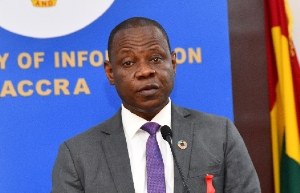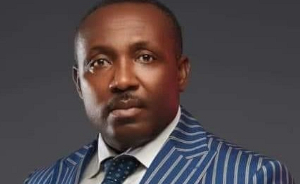The Ghana Health Service (GHS) has revealed a significant disparity in the distribution of medical specialists, with nearly 90% concentrated in the Greater Accra and Ashanti Regions.
Currently, five out of the country's 16 regions are without specialist dental surgeons.
Dr. Patrick Kuma Aboagye emphasized that the unequal distribution and a 50% shortfall in human resources pose a threat to equitable quality healthcare across the country.
"There are still challenges in the distribution of healthcare workers. 88% of all our medical specialists remain in the Greater Accra and Ashanti Regions. Five out of the 16 regions have no specialist dental surgeons. As high as 57% of the public sector nurses' workforce are non-professional nurses as of December 2020," he stated.
The situation is critical as developing countries face serious threats from unsafe healthcare practices.
The World Health Organization (WHO) reports that approximately 1 in 10 patients is harmed in healthcare settings, resulting in over 3 million deaths annually due to unsafe practices.
In low-to-middle-income countries, as many as 4 in 100 people die from unsafe care.
In primary and ambulatory settings, up to 40% of patients are harmed, with 80% of these incidents being avoidable. Common adverse events include medication errors, unsafe surgical procedures, healthcare-associated infections, diagnostic errors, patient falls, pressure ulcers, patient misidentification, unsafe blood transfusions, and venous thromboembolism.
Dr. Aboagye noted that Ghana's issues with unsafe care include hospital-acquired infections, unsafe surgeries, and incorrect medications.
He emphasized the need for innovative interventions to improve the performance of Universal Health Coverage (UHC), which was at 49% in 2021, to enhance the quality and safety of healthcare practices.
Peter Yeboah, Executive Director of the Christian Health Association of Ghana (CHAG), called for a paradigm shift from focusing solely on financing and increasing access to healthcare to prioritizing quality healthcare and human resources.
He stressed that equitable access to quality healthcare delivered by highly skilled and dedicated workers is essential for public trust and achieving UHC, adding that the cost and consequences of sub-optimal care are existential threats to the healthcare system.
"The lack of robust quality systems and structures means that we are failing to meet patient needs, health outcomes, and the trust and confidence of patients in the entire health system. The moment patients sense that quality is sub-optimal, it is a recipe for loss of interest, confidence, and underutilization of services," he stated.
These remarks were made during the annual CHAG conference in Koforidua.
Dr. DaCosta Aboagye, Executive Director of the National Health Insurance Scheme (NHIS), mentioned that claims payments have recently been prompt.
He also announced new interventions to focus NHIS on preventive healthcare by ensuring annual health screenings for subscribers on their birthdays.
Most Rev. Afrifa Agyekum, the Presiding Bishop of the Koforidua Diocese of the Catholic Church, urged the government to improve the conditions of service for healthcare workers.
He also encouraged CHAG healthcare workers to uphold CHAG principles and avoid participating in strike actions, as this undermines the mission of providing quality healthcare.
Click to view details



Health News of Monday, 8 July 2024
Source: kasapafmonline.com

















